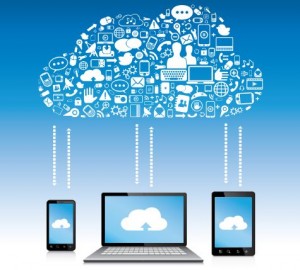Cloud computing, mobility and big data cumulatively they seem to hold answers to an array of questions concerning the future of technology. As mobile enterprise is continuing to grow bigger leaving behind consumer apps, mobile cloud apps for enterprises are going to play a bigger role. While mobile cloud holds great promises as far as enhancing efficiency and productivity in enterprises is concerned, managing the complexity involved with this new technology and managing the massive amounts of data will be the next challenge. Mobile cloud will definitely lower costs and improve decision making, but how it integrates increasing volume of data and end user points will be crucial.
Bridging the data points
The access to the right information at the right time by the right user is the objective around which all data management initiatives and technologies are built. Knowing the location of data and making it accessible among the end points while always maintaining data security by securing against theft or breaches of privacy, this is what remains to be the main objective of data management. The enterprise cloud in this respect can really play a really formidable role as traditional IT infrastructure looks backdated enough to deal with faster, constraint free accessibility and increasing volume of data. Offering real time access to Big Data analytics to different data points and thus helping to improve productivity and lowering redundancy will be the challenge of data management through enterprise mobile cloud.
Metadata standardization for different data sources
The end points for data usage and data production are rapidly increasing and the volume of data is expanding in all directions. To keep control over the usability of growing data stores, data access and interaction points businesses now need to develop insight based data algorithm for different classes of data. No matter where from this data is created, where the data is stored, where it is accessed and shared, this volume of data can be more meaningful and contextually put to use with insight based data analytics tool for diverse uses.
The metadata standardization procedure can be leveraged for this burgeoning horizon of data as well. The metadata standardization can be used on structured databases across the data types in enterprises, cloud data, different types of messages, including email, text, SMS, social media posts, all types of documents including text, spreadsheets, presentations, voice communication data like conversations, voicemails to log files.
How metadata standardization can help Big Data analytics?
Standardizing metadata not only helps retrieving data and bridging data points, but it also plays a great role in the initiatives pertaining to Big Data analytics. Consistent tagging of data involving with standardized client and product IDs will automatically lead to addition of analytical value to the data sets. From identifying market demand to identifying employee engagement in innovation and improvement of products, diverse analytical values can be obtained from such data tagging.
Actually deriving value from the piling enterprise data has always been a key challenge for analysts. Standardization of metadata in this respect can play guiding role to valuable data from the pile of enterprise data generally conceived as debris of digital trash. In this respect enterprise cloud has a big role to play. Enterprise cloud not only enhances the accessibility to data and elevates data management, but it exposes data sets to analytics tools. Thanks to enterprise cloud not only organizational data can be freed from the data centers but it can help identify the specific value of data and identify the importance. Such identification of key data conjunction and corresponding business value is of central importance to business focused Big Data analytics. Mobile enterprise cloud with its robust data management tools and infrastructure thus becomes irreplaceable for managing enterprise data in the time to come.
This is a Fast evolving process
Tagging data sets with different IDs is literally invaluable for enterprise data management and mobile cloud plays a central role to it by offering a great alternative to traditional data infrastructure. Now this standardization and shifting of data to enterprise cloud is a long dragging procedure that involves several elements. Tags employed in managing each specific data sets can make not only data management better, but it can also boast all types of support initiatives concerning aspects like discovery of data, compliance, data security and responsiveness to security threats, etc. All these challenges are completely not insurmountable with the present enterprise cloud and metadata standardization procedure. Naturally, a revolutionary shift from the present state of enterprise data is least expected, but taking the present enterprise data infrastructure as a point of departure the data management will continue to evolve.
Metadata standardization employed in the present state of enterprise data can show how bigger the control one can exercise over an increasing volume of data with such granular level data tagging procedures. Mobile cloud apps getting better and coming with robust data management and analytical capacity would only add more firepower to this solution. By standardizing enterprise data at all levels your business can prepare itself for taking more advantage of mobile cloud and Big Data analytics. More control over your business information will equip you for more business opportunities and it cannot be started without adding insights to your business data.
About Author:
IT consultant Juned Ahmed is the man behind IndianAppDevelopers.com, a company dedicated to healthcare mobile application development services. Juned is responsible for lead generation and community building.

